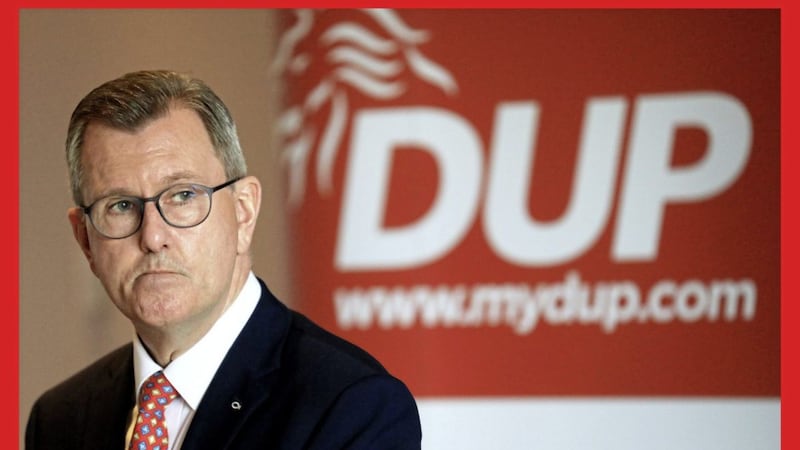THERE is an increasing sense the protocol issue would die of boredom if certain unionist leaders would leave it alone.
This week the UK and the EU kicked the can a long way down the road, tacitly accepting parts of the protocol are unworkable and need to be fixed. Yet Jeffrey Donaldson spent all week reiterating the DUP’s demand that “the Irish Sea border needs to be removed”.
Fine distinctions can be parsed out of the DUP leader’s remarks: the sea border is not the protocol and ‘removed’ could be a flexible term. Donaldson will have been briefed on the government’s thinking on its unilateral extension of grace periods, which the EU has tellingly accepted without protest.
No doubt the DUP is inching towards some carefully triangulated spot between Brussels, London and Ballymena. But who cares any more to follow these painful machinations? Removal of the sea border is clearly not going to happen. At the same time, significant changes are clearly being agreed miles over unionism’s head.
Most unionist voters must have wearily accepted this, while those still insistent on removal are fully aware that Donaldson cannot deliver and is just blustering while events move on. Why not get ahead of events and stake a claim on the major compromises that are coming?
David Trimble is guilty of even worse doomed posturing.
The former UUP leader has written to Joe Biden warning him to drop his support for the protocol as it breaches the Good Friday Agreement.
This US president will not, of course, be dropping his support. Nor does this really matter, despite all the unionist fears and nationalist hopes placed on Washington pressurising London.
The government has given up on a comprehensive US trade deal while Biden or Boris Johnson are in office, as ministers have been briefing everyone - except David Trimble, apparently. This is not so much because of Biden’s suspected hostility to the UK as because such deals normally take a decade or more to negotiate. Donald Trump’s dodgy promise of a shortcut no longer applies.
The UUP is inching towards healthy scepticism on the protocol, admitting it is here to stay and hoping it can largely be mitigated, while still not welcoming its existence. If that is not already the default view of the unionist population, it is the only view it can settle on long term. The best precedent to consider is the Anglo-Irish Agreement: a treaty that enraged unionism in principle but was too dull to stay angry about in practice.
New UUP leader Doug Beattie told The Irish News this week he will back a new cross-border body to make the protocol work and address its democratic deficit. Arrangements along similar lines are believed to be what Brussels and London plan to examine during their newly-extended truce.
Compromising on touchstone sea border problems with food and medicines, then kicking the details into arcane multilateral committees, is an Anglo-Irish solution on speed, or more correctly, on Mogadon.
In selling this to unionist voters, it helps the UUP not to have caused the protocol in the first place. The DUP cannot wash its hands of responsibility without the sort of clear-out at the top that normally comes at Westminster through a harsh spell in opposition. The Stormont system makes that difficult, although not impossible, if the party is doing as badly as polls suggest.
The nationalist equivalent of demanding the protocol’s removal is calling for its ‘rigorous implementation’.
The danger of this phrase was not initially obvious, certainly to Alliance when it signed up to it last September alongside Sinn Féin, the SDLP and the Greens. However, like demanding removal, it has come to appear completely unrealistic and to seem driven more by constitutional agendas than by what is in everyone’s best economic interests.
So it is revealing that the language of rigorous implementation has been quietly dropped.
Sinn Féin junior minister Declan Kearney, standing in for deputy first minister Michelle O’Neill, spoke this week of “smooth operation” of the protocol. He acknowledged “a number of anomalies and difficulties that need to be smoothed out” and welcomed the fact that “work is taking place behind the scenes”.
Who wants to be left behind by developments between Brussels and London, or worse still, to seem in favour of medicine or food supply problems - especially if problems occur?
Removal and rigorous implementation are both extreme positions. In time-honoured Northern Ireland fashion, they are becoming as bad as each other.








